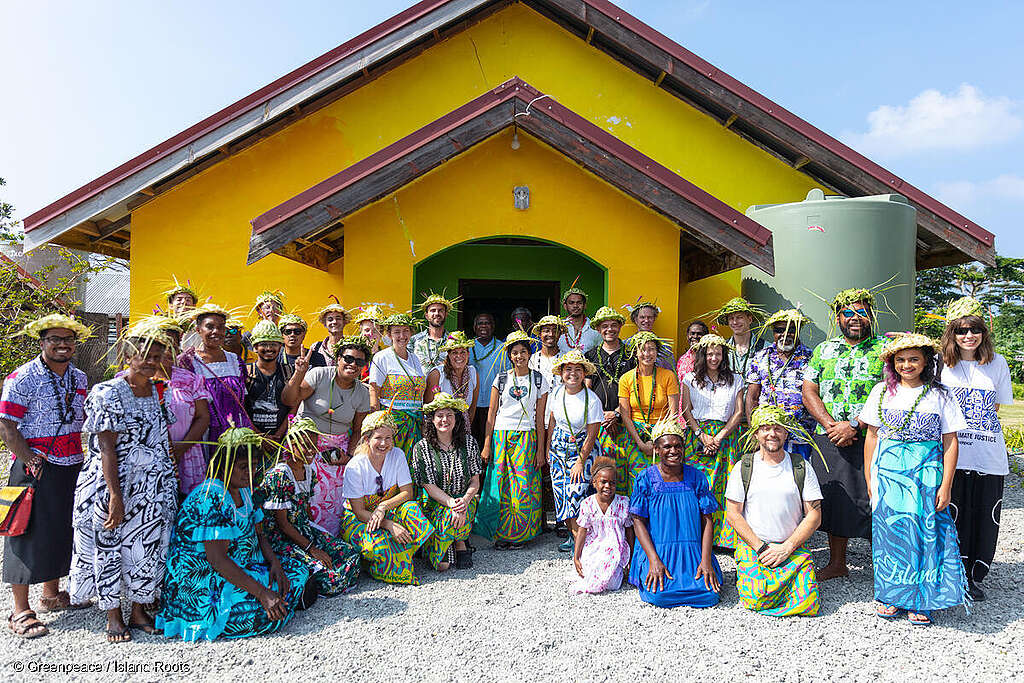
Listen to audio
I’d like to begin this letter to you by sharing a story.
It’s a late July morning in 2023 and I am on a community visit to the village of Eton, in Efate, which is the third largest island of Vanuatu. There are a few of us walking across the neatly mowed bright green lawn of a distant flat field under deep skies of reassuring blue, and we are about to participate in the Sunday service of a small church, painted canary yellow.
Although I don’t observe any religion, I recognise the generosity and privilege in being welcomed into this place of vivid colours, surrounded by the fathomlessness of the great Pacific Ocean.
But I am feeling an ache in my heart. Truth is, there has been a lot of travel for me in the service of Greenpeace this year and I am homesick. I want to be back with my partner and my daughters. I’m craving those moments of trust, closeness and silliness; the shared words of secret special meaning, and hugs on our old olive corduroy couch.
These are among the most precious strands of love, of being alive. I am missing our little dog Bonnie too, and… frankly just everything about being home. I’m also heavily conscious that the people I love most are carrying extra luggage because I’m away—my partner shouldering all of the domestic labour; the kids feeling my absence.
Longing for home, whatever that means to each of us, is an emotion in common to humanity. And we feel it most, I think, in times when the world feels at its coldest and cruellest.
I’m feeling another kind of pang, too. Vanuatu has been smashed by a trio of recent cyclones: whirling uncanny beasts mislabelled with common, unthreatening names: Irene, Judy, Kevin.
The broken trees and other wreckage is still plainly visible. In a climactic sense, the home that the ni-Vanuatu elders were born into has already gone, unjustly stolen away by global warming driven by coal, oil and gas corporations making a fortune from what is causing the misery.
Some are being hit well before others, but the truth is that all of our homes are tender and vulnerable before the storms that are to come. I think again of my children.
A colleague, Charlene, notices my face giving something away and asks me what’s up. I confess the ache that I am feeling. She responds reflexively and instantly, smiling, and offering a few words of moral comradeship and human understanding that lift me up with their intuitive kindness.
Perhaps you’ve had experiences like this too. We draw strength and joy from the infinitude of these small acts of love—expressed as moments of kindness, trust, generosity, caring, camaraderie—that make up the nurturing fabric of human society; the best of our instincts as a fundamentally social species.
Later, inside the church, I join in the singing as best as I can. Yumi sing, as the hymn book says in Bislama; ‘we sing’.
It is love, too, that is at the heart of Greenpeace’s mission—to secure an earth capable of nurturing life in all of its magnificent diversity. Every day, we express that ethic through our campaigning: determined, collective effort that is motivated above all by love for people and for nature. This is our moral core and in my experience it is often what calls people to become part of Greenpeace.
So in that spirit, I’m going to start sharing some thoughts about the experience and sense of connection, love and purpose that is at the heart of Greenpeace, in a monthly letter to be called With love,.
I also really hope this will develop into a conversation too. In every future letter, I will respond to a question that we have received in correspondence, or that someone has asked me in person—so if there is anything that you are curious about, then please let me know by return email, and I’ll do my best to answer.
When I did arrive back from Vanuatu last year, I hugged my kids and my partner tightly, and Bonnie shook with astonishment and excitement, as she always does when one of the family returns from having been away. Would that every person on this planet was able to come home to an equivalent feeling; to experience the joy and security of returning to a place of love, safety and deep belonging.
The storms that are already here and the greater tempests to come threaten everything we care about. But with love, shared work, and unwavering purpose, we can still grasp the possibilities of regeneration and resurgence—and so we will.
Thank you for reading this far. I’m very much looking forward to corresponding with you, and will write one of these letters again next month.


